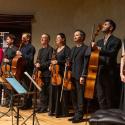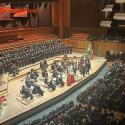No one could accuse Manchester’s musical forces of short-changing Richard Strauss on the occasion of the 150th anniversary of his birth. Under the title Strauss’s Voice, over two months three orchestras, eight conductors and a dozen soloists have delivered eleven concerts and several open rehearsals and talks. The enterprise has been led as a labour of love by 88-year-old Strauss authority Michael Kennedy, who started the series by enthusing about the composer’s ability “to exploit the radiance, eroticism, drama and tenderness of a voice”, especially the soprano voice.
It fell to principal guest conductor John Storgårds and the BBC Philharmonic to bring the series to a triumphant end, firstly with the Swedish soprano Hillevi Martinpelto completing the performance in the series of all the orchestral songs and, finally, with an exhilarating account of Ein Heldenleben.
As a lead-in to the Straussfest, we had Mahler’s contemporaneous Todtenfeier, written in 1888, in which he poses the ultimate questions: “What is life for? Is it a huge, frightful joke?” Of course, we know that it is recognising the suicidal end of a life with funeral rites and we know that the piece evolved into the opening movement of his Second Symphony, the “Resurrection”. Storgårds carefully managed the scale of the piece and brought out the tragic inevitability of the music.
The six orchestral songs rounding off the cycle were split into two groups of three, straddling the interval. The first set, "Liebeshymnus", "Die Heiligen drei Könige aus Morgenland" ("We Three Kings of Orient Are") and "Frühlingsfeier Spring Festival"), focus on his love for his wife (“Hail to the day when first I beheld you) and his devotion to his religious mother.
 The second trio - "Winterliebe", "Gesang der Apollopriesterin" and "Zueignung" ("Dedication") - again concern the love he never tires of expressing (even in Winter). Hillevi Martinpelto (pictured right) was in fine form throughout. She has a lovely and powerful voice, well able to cope with the orchestral forces. She caught the ecstatic moments and the passion, but with a secure control. In Spring Festival, her repeated cries of “Adonis! Adonis!” were climactic. Her account of the Priestess of Apollo song, one of Strauss’s finest compositions, was sublime. And it was nicely judged to end the songs with the first one of the first group of published lieder in 1885, Zueignung, when she signs off with “You wondrous Helen”.
The second trio - "Winterliebe", "Gesang der Apollopriesterin" and "Zueignung" ("Dedication") - again concern the love he never tires of expressing (even in Winter). Hillevi Martinpelto (pictured right) was in fine form throughout. She has a lovely and powerful voice, well able to cope with the orchestral forces. She caught the ecstatic moments and the passion, but with a secure control. In Spring Festival, her repeated cries of “Adonis! Adonis!” were climactic. Her account of the Priestess of Apollo song, one of Strauss’s finest compositions, was sublime. And it was nicely judged to end the songs with the first one of the first group of published lieder in 1885, Zueignung, when she signs off with “You wondrous Helen”.
What shines through this whole Strauss immersion is the deeply personal expression of love for Pauline, devotion, passion, humour and final contentment. For us, the series culminated in the semi-autobiographical (or is it?) A Hero’s Life, although he said, “I’m no hero, I’m not made for battle.” And yet the battle ebbs and flows musically between the composer and his adversaries, the music critics, each with their recurring themes, but modified by the theme for his “companion”, his wife. The themes come and go and interplay magically, often wittily. In the fifth section he quotes nearly 30 passages from nine of his compositions as if to record a retrospective of his achievements before announcing his contented retirement with Pauline. After all the sound and fury, it is a moving ending.
Storgårds commanded his huge musical forces with drive and sensitivity. The power created from the battery of brass and percussion was tremendous and, in contrast, the superb violin solo (the wife’s theme) by guest leader Pieter Schoeman was a real highlight. What a way to end. Well, not quite, because there was a thoughtful post-concert postscript to the series, looking to the future by having students from Chetham’s School of Music perform chamber music written by Strauss during his youth.













Add comment